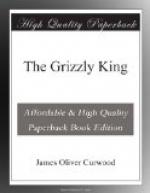For some strange reason he was not frightened at the situation. He found that even over the level spaces he could scarcely drag his snow shoes, but this had ceased to alarm him as he had been alarmed at first. He went on, hour after hour, weaker and weaker. Within himself there was still life which reasoned that if death were to come it could not come in a better way. It at least promised to be painless—even pleasant. The sharp, stinging pains of hunger, like little electrical knives piercing him, were gone; he no longer experienced a sensation of intense cold; he almost felt that he could lie down in the drifted snow and sleep peacefully. He knew what it would be—a sleep without end—with the arctic foxes to pick his bones, and so he resisted the temptation and forced himself onward. The storm still swept straight west from Hudson’s Bay, bringing with it endless volleys of snow, round and hard as fine shot; snow that had at first seemed to pierce his flesh, and which swished past his feet, as if trying to trip him, and tossed itself in windrows and mountains in his path. If he could only find timber—shelter! That was what he worked for now. When he had last looked at his watch it was nine o’clock in the morning; now it was late in the afternoon. It might as well have been night. The storm had long since half blinded him. He could not see a dozen paces ahead. But the little life in him still reasoned bravely. It was a heroic spark of life, a fighting spark, and hard to put out. It told him that when he came to shelter be would at least feel it, and that he must fight until the last. And all this time, for ages and ages it seemed to him, he kept mumbling over and over again Ransom’s words:
"Go back—Go back—Go back—–“
They rang in his brain. He tried to keep step with their monotone. The storm could not drown them. They were meaningless words to him now, but they kept him company. Also, his rifle was meaningless, but he clung to it. The pack on his back held no significance and no weight for him. He might have travelled a mile or ten miles an hour and he would not have sensed the difference. Most men would have buried themselves in the snow, and died in comfort, dreaming the pleasant dreams which come as a sort of recompense to the unfortunate who die of starvation and cold. But the fighting




